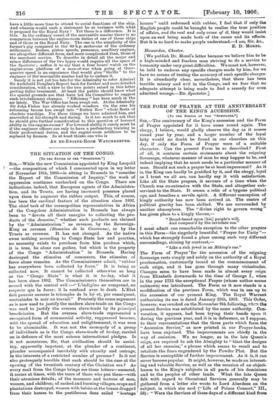THE SITUATION ON THE CONGO.
[To THE EDITOR OF THE " SPECTATOR...1 Sin,—While the new Commission appointed by King Leopold —the composition of which I commented upon in my letter of November 18th, 1905—is sitting in Brussels to "consider the Report of the Commission of Inquiry," the work of oppression continues unchecked on the Congo. There are indications, indeed, that European agents of the Administra- tion, and its Trusts, are having increased pressure placed upon them to augment the rubber output. This, of course, has been the cardinal feature of the situation since 1892. The chief task of the cosmopolitan representatives in Africa of the Congolese Administration in Brussels has always been to " devote all their energies to collecting the pro- ducts of the domaine," whether such products are claimed by the "Administration " as revenue, by the Sovereign- King as revenue (Domaine de la Couronne), or by the Trusts as revenue. It has not changed. As the native owns nothing according to Congo State law and practice, no necessity exists to purchase from him produce which, it is true, he alone can gather, but which is the property of the Congo " Administration " in Brussels. Having destroyed the stimulus of commerce, the stimulus of force alone remains. As the Commissioners admit, "rubber has everywhere been collected by force." It is being so Collected now. It cannot be collected otherwise so long as the "Congo State" is what it is to-day, what it has been since 1892. The Commissioners themselves are in accord with the central evil :—" L'indigene ne comprend, ne respecte que in force : it la confond avec le droit. L'Etat doit pouvoir assurer le triomphe de in loi et, par consequent, contraindre le noir an travail." Precisely the same argument as is now used to justify the modern slave-trade on the Congo was used to justify the oversee slave-trade by its principal beneficiaries. But the oversee slave-trade represented a recognised form of commercial activity, suppressed because, with the spread of education and enlightenment, it was seen to be abominable. It was not the monopoly of a group of individuals as is the Congo slave-trade of to-day, carried on in defiance of the most solemn international pledges. Is it not monstrous, Sir, that civilisation should be assist- ing, apparently impotent, at the plunder of a continent, plunder accompanied inevitably with atrocity and outrage, in the interests of a restricted number of persons ? Is it not also grotesquely horrible that such should be the case at the opening of the twentieth century of the Christian era ? As every mail from the Congo brings me these letters—smeared, it seems at times, with the tears of those who pen them—with their atrocious details ; of the massacre and torture of men, women, and children; of sacked and burning villages, crops and plantations destroyed, women with babies at the breast dragged from their homes to the pestiferous dens called " hostage houses " until redeemed with rubber, I feel that if only the English people could be brought to realise the true' position of affairs, and the real and only cause of it, they would insist upon an end being made both of the cause and its effects. But it is so hard to make people understand.—I am, Sir, &c.,
E. D. MOREL.
Hawarden, Chester.
[We publish Dr. Morel's letter because we believe him to be a high-minded and fearless man striving to do a service to humanity under very great difficulties. We must not, however, be held to endorse any specific charges made by him, for we have no means of testing the accuracy of such specific charges. It is abundantly clear, nevertheless, that there has been terrible misery and evil in the Congo, and we fear that no adequate attempt is being made to find a remedy for even admitted wrongs.—ED. Spectator.]










































 Previous page
Previous page